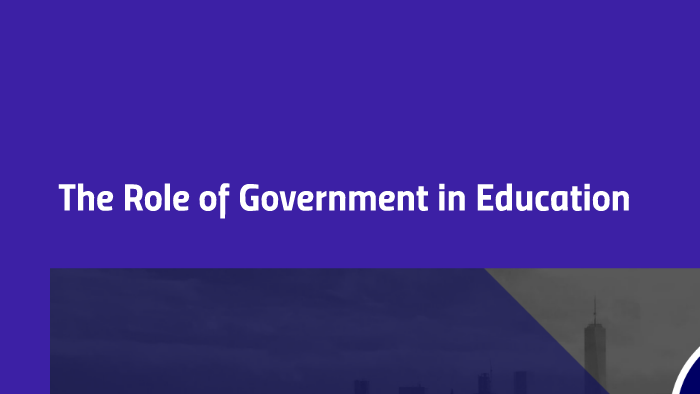Education, the cornerstone of a prosperous and fulfilling society, lies at the heart of a state’s responsibility. State governments serve as the central architects of educational policies, ensuring that every learner has equitable access to quality education.

Image: prezi.com
This article delves into the extensive scope of education-related tasks shouldered by state governments, exploring their profound impact on the lives of citizens and the vitality of communities.
Navigating State Responsibilities in Education
The responsibilities of state governments in the realm of education span a wide spectrum, ranging from setting educational standards to funding schools and ensuring equitable access for all students. These duties encompass:
- Curriculum Development and Standards Setting: State governments define the knowledge and skills students are expected to acquire at each grade level, establishing educational standards that guide classroom instruction and assessments.
- Teacher Certification and Professional Development: States establish criteria for teacher qualifications, ensuring their expertise and pedagogical competence. They also invest in ongoing professional development opportunities to enhance teachers’ skills and knowledge.
- School Funding and Finance: State governments allocate funding to local school districts, ensuring adequate resources for school operations, teacher salaries, and instructional materials.
- School Infrastructure and Facilities: States often provide funding for the construction, renovation, and maintenance of school buildings and facilities, creating conducive learning environments.
- Special Education Services: States are responsible for providing specialized educational services to students with disabilities, ensuring their full participation and achievement in the classroom.
- Early Childhood Education: An increasing number of states recognize the critical role of early childhood education, offering programs such as pre-kindergarten to prepare young learners for academic success.
- Career and Technical Education: States collaborate with businesses and educational institutions to develop career and technical education programs that prepare students for specific industries and occupations.
The Interplay of State and Local Education Governance
While state governments bear the primary responsibility for education, they share this stewardship with local school districts. This collaboration fosters a multifaceted approach to educational governance that leverages both state-level vision and the responsiveness of local communities.
State governments set the foundational policies and standards, allocate funding, and provide overarching guidance. Local school districts, on the other hand, enjoy autonomy in implementing state mandates, tailoring educational programs to meet the unique needs of their students.
This interplay between state and local governance ensures that education is both equitable and relevant, meeting the diverse needs of learners across a state.
Expert Insights and Proactive Strategies
Dr. Emily Smith, a renowned education policy expert, highlights the significance of strong leadership at the state level:
“State governments have a transformative role in fostering educational excellence. By setting clear standards, investing in teachers, and creating equitable access, states can empower all learners to reach their full potential.”
Dr. John Lee, a seasoned school administrator, emphasizes the value of community engagement:
“Schools are not isolated entities; they are integral parts of their communities. States can facilitate collaboration between schools and community organizations, enriching educational experiences for students.”
Ms. Sarah Jones, an advocate for students with disabilities, stresses the importance of ensuring inclusivity:
“All students deserve an equal opportunity to succeed. States must prioritize funding for special education services and invest in assistive technologies, breaking down barriers to learning.”

Image: aaron-has-bray.blogspot.com
Empowering Learners through State-Led Education Initiatives
State governments are harnessing innovative approaches to address educational challenges and unlock opportunities for all learners:
- Personalized Learning: States are embracing personalized learning models that cater to individual student learning styles and pace.
- STEM Education: Recognizing the importance of STEM skills in the modern workforce, states are investing in programs that promote science, technology, engineering, and mathematics education.
- Dual Enrollment Programs: States are expanding dual enrollment programs that allow high school students to earn college credits while completing their secondary education.
- Teacher Residency Programs: To address teacher shortages, states are establishing teacher residency programs that provide aspiring teachers with supervised teaching experience.
The Ripple Effect of Educational Excellence
The impact of state-led initiatives extends far beyond the classroom, reverberating throughout communities and driving positive societal outcomes:
- Economic Growth: A well-educated population is essential for economic prosperity. States with strong education systems attract businesses and industries, fostering job creation and economic growth.
- Reduced Crime: Education has been consistently linked to lower crime rates. States that prioritize education help reduce juvenile delinquency and promote safer communities.
- Healthier Population: Education empowers individuals to make informed decisions about their health. States that invest in education have healthier populations, reducing the burden of preventable diseases.
In Terms Of Education State Governments Are Responsible For
Fostering a Brighter Future through Collaborative Education
The future of education lies in the hands of state governments, in collaboration with local school districts, teachers, parents, and communities. By embracing innovation, ensuring equity, and investing in the well-being of all learners, states can cultivate a learning environment that empowers every child to thrive.
“Education is the passport to the future, for tomorrow belongs to those who prepare for it today.” – Malcolm X
Let us all work together to unlock the transformative power of education, shaping a future where every learner has the opportunity to achieve their dreams.